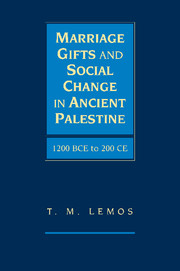Book contents
- Frontmatter
- Contents
- Acknowledgments
- Abbreviations
- Introduction
- 1 Biblical Evidence for Marriage Gifts
- 2 Postexilic Evidence for Marriage Gifts
- 3 Anthropology and the Study of Marriage Gifts
- 4 The Social Structure of Ancient Israel from Iron I to the Babylonian Exile
- 5 The Social Structure of Palestine in the Second Temple Period
- Final Analysis and Conclusions
- Appendix: Marriage Gifts Among Judeans Living in Babylonia During the Sixth Century BCE
- Glossary
- Bibliography
- Index of Biblical and Other Ancient Sources
- General Index
2 - Postexilic Evidence for Marriage Gifts
Published online by Cambridge University Press: 04 August 2010
- Frontmatter
- Contents
- Acknowledgments
- Abbreviations
- Introduction
- 1 Biblical Evidence for Marriage Gifts
- 2 Postexilic Evidence for Marriage Gifts
- 3 Anthropology and the Study of Marriage Gifts
- 4 The Social Structure of Ancient Israel from Iron I to the Babylonian Exile
- 5 The Social Structure of Palestine in the Second Temple Period
- Final Analysis and Conclusions
- Appendix: Marriage Gifts Among Judeans Living in Babylonia During the Sixth Century BCE
- Glossary
- Bibliography
- Index of Biblical and Other Ancient Sources
- General Index
Summary
INTRODUCTION
As stated in Chapter 1, none of the biblical texts that discuss bridewealth or dowry is definitively postexilic. The quintessentially Second Temple period texts in the Hebrew canon – Ezra-Nehemiah, Daniel, Esther, and so on – do not mention any sort of marital prestations. Yet, there is much postexilic evidence regarding this issue. This evidence is extrabiblical and is found in archives of marriage documents from Elephantine in Egypt and from the Judean desert, as well as in the book of Tobit, in some pseudepigraphic texts, and in texts by Philo and Josephus. Though the postexilic evidence, like that in the earlier, biblical material, is not always as straightforward as one might like, it is in many cases quite clear. As a whole, this evidence readily demonstrates that the situation concerning marital gifts was in many ways different from what it had been before the exile. While one finds a variety of marriage gifts in the Hebrew Bible, we saw that bridewealth was the most prevalent type of gift. In the postexilic evidence, however, the exact opposite is true: dowry has clearly become the predominant form of marital gift exchange. In fact, there is little evidence for bridewealth as it was known in the period before the exile.
EPIGRAPHIC EVIDENCE FOR MARRIAGE GIFTS: ELEPHANTINE
Of the two sets of marriage contracts relevant to this issue – namely, that from Elephantine and that from the Judean desert – the former group is centuries earlier, dating to the fifth century BCE.
- Type
- Chapter
- Information
- Marriage Gifts and Social Change in Ancient Palestine1200 BCE to 200 CE, pp. 62 - 88Publisher: Cambridge University PressPrint publication year: 2010

